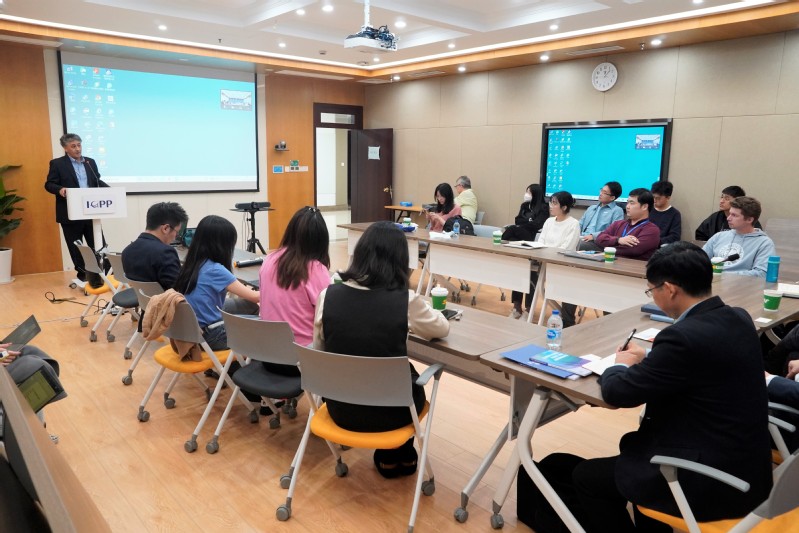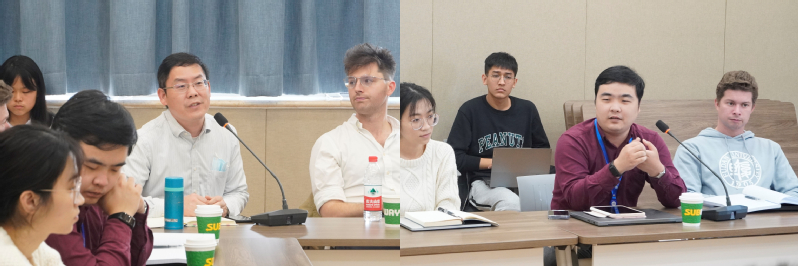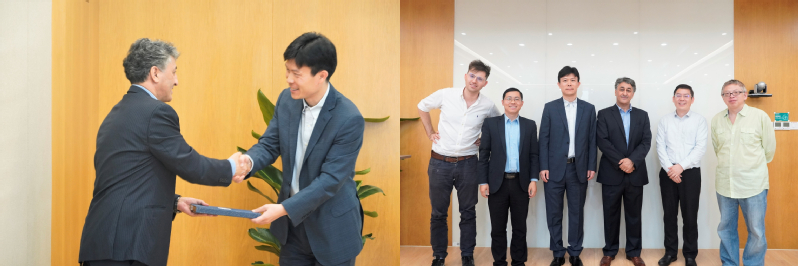Events



On November 10, 2022, the 37th lecture of the Fudan-LSE Lecture Series was held in the conference room on 8th Floor, West Sub-Building of Guanghua Towers. The speaker was Dr. Nath Aldalala’a, an Adjunct Professor of the Institute for Global Public Policy. The topic was China's Relations with the Gulf States: Challenges and Prospects. Prof. Yijia Jing, Dean of IGPP, hosted the lecture. Prof. Huaigao Qi, Associate Dean of the Institute of International Studies, Prof. Degang Sun, Director of the Center for Middle Eastern Studies, Prof. Tongdong Bai, Professor of the School of Philosophy, Prof. Chuchu Zhang, Associate Researcher of the School of International Relations & Public Affairs, Jacob Dreyer, editor of Springer Nature Press and more than 20 teachers and students of Fudan University attended the lecture.

At the beginning of the lecture, Prof. Jing briefly introduced Prof. Nath Aldalala’a and spoke highly of his research contributions in the field of relations between China and the Gulf-States. He expressed sincere welcome and gratitude to Dr. Nath for visiting IGPP as an adjunct professor.
In the lecture, Prof. Nath shared his in-depth and unique views on the status quo and future of China-Arab relations. He introduced that with the increase of China's trade and investment in Arab countries in recent years, China's economic influence has been expanding, and the degree of exchanges and cooperation has been deepening. Yet, Arab need to know more China’s culture, which has become a key reason to promote the development of China-Arab relations at present.
Prof. Nath reviewed the history of cultural exchanges between China and Arab countries from the historical dimension, and explored the image of China in the eyes of Arab countries in history. He quoted from the book: “Book of the Categories of Nations” by Ṣāʿid al-Andalusī (Andalusī, Ṣāʿid ibn Ahmad, 1029–1070). Ṣāʿid wrote Ṭabaqāt al-ʾUmam in A.D. 1068/A.H. The book introduced China as a country that does not cultivate science, but pays attention to manual labor, industrial technology and the manufacture of various tools. It can be seen that historically, the impression of the Arab world on China was mainly of a country that produce commodities rather than a country that produces knowledge. Due to these reasons and the geographical distance between the two places, the Arab world lacks interest in understanding China’s culture.
This historical image has also influenced the further understanding between the two regions. In modern and contemporary times, the communication between Chinese and Arab literature and art is also very limited. The current translation efforts in most cases are commercial and do not focus in-depth on those works that represent the rich and long-standing Chinese thoughts. This situation has improved since China novelist Mo Yan won the Nobel Prize for Literature in 2012, and the Arab world began to make efforts to translate China literature into Arabic. However, compared with Japanese and Korean works, their popularity is still limited.
In view of the limited influence of China's literature, philosophy, music or China thought in the Arab region, Prof. Nath believes that although China has been paid cumulative attention economically in the past few years, the cultural reputation of China has not received corresponding attention due to the influence of the global COVID-19 pandemic and religious and ethnic issues. To enhance the reputation of China’s culture in the Arab world, we should first pay more attention to cultural projects, instead of limiting China's presence in the economic investment in certain industries. We should nurture and enhance it through intensive projects by increasing more people-to-people contacts between China and the Arab world.
According to prof. Nath, China’s academic, research, cultural and intellectual institutions are rich enough to contribute to bridging gaps between China and the peoples of the Middle East. Therefore, investing in education through attracting more Arab students to Chinese institutions could be a milestone. China should invest in its own young generations by encouraging them to study Arabic language and become the cultural ambassadors and representatives of China.

After that, Prof. Nath had cordial interaction with teachers and students on issues including China's popularity in Arab countries, China's acceptance of Arab culture and how the young generation can promote the development of China-Arab relations. He said that in recent years, China has a greater economic influence. China is already the largest trading partner of Arab countries, and its trade volume is increasing year by year, but its cultural influence is rather weak. China's universities and research institutions rarely set up branches in the Middle East. It is hoped that Chinese scholars and students studying international relations and governance should pay more attention to the Middle East and make exchanges and visits there to contribute to the development of bilateral relations.

In the end, Professor Jing summed up the lecture, pointing out that the current pattern of Sino-Arab exchanges, which is centred on economy, should be adjusted in the future. Civilian and academic exchanges should be increased to promote the people's connections between China and Arab countries. He presented Prof. Nath with a paperweight representing China's traditional calligraphy culture as a gift and expressed his gratitude again. The lecture ended successfully.